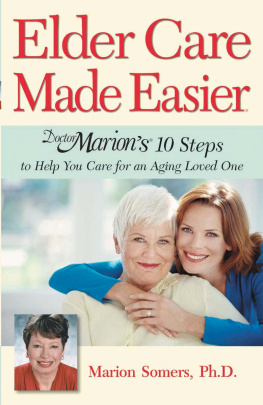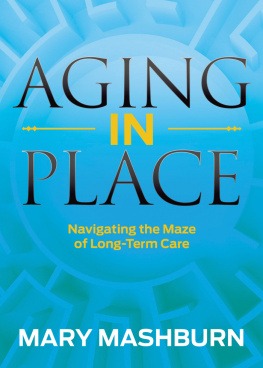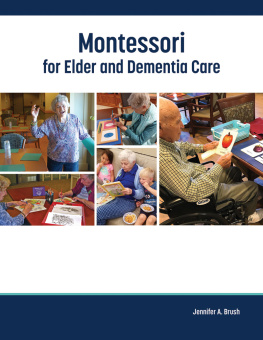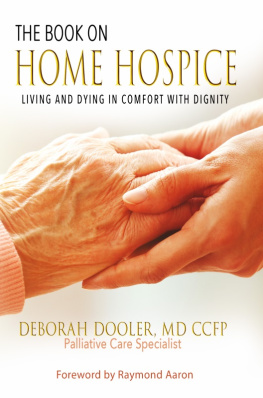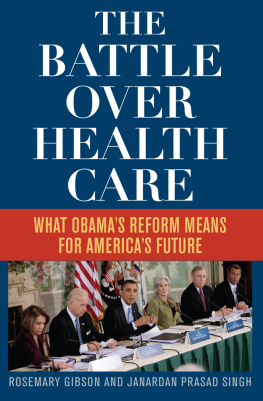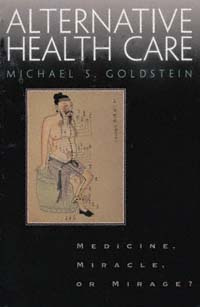Additional Praise for The Age of Dignity
Joining a storytellers ear to an organizers spirit, Ai-jen Poo offers a practical guide to creating a more caring America that is more prosperous and justfor immigrant women hired to care no less than elder boomers in need.
Eileen Boris, co-author of Caring for America and Hull Professor of Feminist Studies at the University of California, Santa Barbara
Ai-jen understands as well as anyone that the nature of work is changing. She is one of the smartest and most empathetic advocates in America, and The Age of Dignity has the solutions we need to ensure workers of any age have the independence and dignity they deserve.
Sara Horowitz, founder and executive director of the Freelancers Union
Ai-jen Poo is among our most compelling social movement leaders. In The Age of Dignity, a most thoughtful and readable book, she invites us to join arms and reshape our economy and our culture.
Ambassador Swanee Hunt, chair of Hunt Alternatives and Eleanor Roosevelt Lecturer in Public Policy at Harvard Universitys Kennedy School of Government
Within the next twenty-five years, tens of millions of baby boomers are going to become frail and need long-term services and supports. How will we live? Who will care for us? In The Age of Dignity, Ai-jen Poo presents a bold and inspiring vision for the futureone that can unite caregivers, older adults and their families, advocates, and policy makers to join forces to address the extraordinary care challenge that is clearly coming.
Jim Firman, president and CEO of the National Council on Aging

2015 by Ai-jen Poo
Photographs on pp. 16, 42, and 70 by Michele Asselin
Photographs on pp. 112, 140, and 170 by Alessandra Sanguinetti
All rights reserved.
No part of this book may be reproduced, in any form, without written permission from the publisher.
Excerpt from We Alone from Horses Make a Landscape Look More Beautiful: Poetry by Alice Walker on p. 70 copyright 1984 by Alice Walker. Reprinted by permission of Houghton Mifflin Harcourt Publishing Company. All rights reserved.
Requests for permission to reproduce selections from this book should be mailed to: Permissions Department, The New Press, 120 Wall Street, 31st floor, New York, NY 10005.
Published in the United States by The New Press, New York, 2015
Distributed by Perseus Distribution
LIBRARY OF CONGRESS CATALOGING-IN-PUBLICATION DATA
Poo, Ai-jen.
The age of dignity : preparing for the elder boom in a changing America / Ai-jen Poo, with Ariane Conrad.
pages cm
Includes bibliographical references and index.
ISBN 978-1-62097-046-1 (e-book) 1. Older peopleCareUnited States. 2. Older peopleNursing home careUnited States. 3. Older peopleServices forUnited States. 4. Population agingUnited States. I. Title.
HV1461.P66 2015
361.60973dc23 2014029148
The New Press publishes books that promote and enrich public discussion and understanding of the issues vital to our democracy and to a more equitable world. These books are made possible by the enthusiasm of our readers; the support of a committed group of donors, large and small; the collaboration of our many partners in the independent media and the not-for-profit sector; booksellers, who often hand-sell New Press books; librarians; and above all by our authors.
www.thenewpress.com
Composition by dix!
This book was set in Fournier MT
2 4 6 8 10 9 7 5 3 1
For the millions of women whose lifes work is caring for others. Thank you for doing the work that makes all other work possible.
For my maternal grandmother and paternal grandfather. Your experiences and all that Ive learned from you light the way forward.
CONTENTS
THE AGE OF DIGNITY
My fathers father, Liang Shao Pu, lived to the age of ninety-three. A lifelong student and then teacher of tai chi and a diehard Wheel of Fortune fan, he had a slow, deep-throated laugh that never failed to infect my sister and me, sending us into spasms of giggles. After moving from Taiwan to the United States to be close to his children and grandchildren, my grandfather often picked us up from school, the silhouette of his baseball cap visible from down the block. He was never late.
My grandfather quietly sustained the heartbreaks of my parents divorce, the passing of most of his friends, and then the loss of his wife of more than forty years. After my grandmothers stroke, she could no longer care for herself. With tremendous courage and love, for years he cooked every meal, talked to her, and kept her comfortable until the end. One of my greatest regrets in life is that we did not provide him with the same comfort and care in the final moments of his life.
After repeated strokes, my grandfathers condition had deteriorated to the point that my dad no longer felt capable of providing the support he needed to stay at home and could not find appropriate home care support, so my grandfather was placed in a nursing home, against his wishes. I visited my grandfather there before he passed away.
My grandfathers bed was along a wall in a large, dark room with six other people, half of whom were completely silent, while the other half expressed their misery in loud, painful cries. The room lights were kept off, while a sickly fluorescent light in the hallway flickered. The place smelled like mold and death. It was my heart-wrenching introduction to dehumanizing institutional care.
When I arrived at his bedside, my grandfather was distressed. He believed the nursing home staff was trying to poison him. He had not slept or eaten for some time. He was frightened and in pain. He was a shadow of the person I knew growing up. I was furious and devastated.
After three months, he passed away in that facility. I almost feel as though he died the moment he arrived there; his dignity was stripped away upon entry. My father, my sister, and I will always regret that my grandfathers final hours and ultimately his death were so lacking in comfort and beauty. He meant so much to us. I so wish we had been able to keep him at home.
Im far from alone in my aversion to nursing homes. Nearly 90 percent of Americans feel institutions are not the appropriate place for elders to spend their final moments, months, or years. The great majority of us want to live and age at home. The question is how, exactly, we can manage that.
America is about to experience an elder boom, a direct result of the baby boom of 1946 to 1964. We have more senior citizens in America today than weve had at any time in our history. Every eight seconds an American turns sixty-five; thats more than ten thousand people per day, almost 4 million per year. A century ago, just about 3 percent of the population was sixty-five or older. Today more than 13 percent of Americans are over sixty-five, and by 2030, the number will be 20 percent. The 5 million Americans older than eighty-five, our countrys fastest-growing demographic, will number 11.5 million by 2035. Because of advances in health care and technology, people are living longer than ever, often into their nineties or breaking one hundred.
Lets remember: people getting older is not a crisis; its a blessing. Were living longer; the question is how we should live. As a country, we have to figure out how to embrace this demographic shift with grace. Just as the baby boom brought with it incredible power and opportunity, so does the coming elder boom.
One thing we know is that the longer people live, the more likely they are to need assistance. Seventy percent of people aged sixty-five or older need some form of support. By 2050, the total number of individuals needing long-term care and personal assistance is projected to grow from 12 million to 27 million. It is often assumed that women will absorb these tasks, as they have for much of our countrys history, but that is not going to happen in twenty-first-century America. Most households today are dual income, which means there is no one at home full-time; at the same time, more and more American households have both children and aging parents who need support and care every day. The need for professional caregivers is skyrocketing.
Next page

